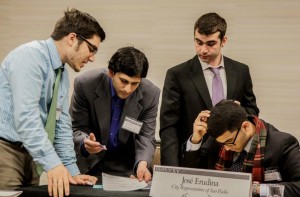This article was written by Parvathy Murukurthy (Director-General of ChoMUN XVI and Head Delegate of the University of Chicago Model UN Team)
“Weird,” “crazy,” and “disorganized” are some of the words that go through a GA delegate’s head when she thinks of crisis committees. As a GA delegate myself, I had never had any interest in going over to the “dark side” of crisis; instead, I much preferred discussing “realistic” topics, and not being constantly surprised by updates that would change the topic. But although I was convinced that traditional committees and crisis committees were intrinsically different and required two very different delegate styles, I’ve come to realize that any delegate can easily transition back and forth if he or she so chooses.
The key is that any delegate—whether specializing in crisis or traditional committees—has to master two main skills: speaking and writing. Even though traditional committee speeches and resolutions seem more “organized” than crisis committee speeches, the difference lies exclusively in the subject matter and intended impact. With regards to the difference in subject matter, the difference is minimal: the change in subject matter from SPECPOL to the WHO is typically no larger than the change in subject matter from SPECPOL to a crisis committee. In either case, you must analyze the topic in the same way, emphasizing relevant external factors, causal trends, and correlations. Similarly, with regards to intended impact, you are trying to craft a long-term, comprehensive solution in most traditional committees; whereas in most crisis committees, you are working towards multiple, short-term solutions.
Consider the following formulas:
Speeches
Traditional Committee Speech = Topic + Country Stance + Solutions + Outcome
Example: Medical trials in developing countries + Nicaragua is a developing country and has been personally affected by medical trials + Therefore, we recommend ethical committees to be involved in pre-trial evaluations + This way, Nicaragua and other developing countries can both take part in medical advancements by participating in medical trials and also protect their people from unethical medical practices.
Crisis Committee Speech = Topic + Position Stance + Related Solutions + Outcome
Example: Preemptive war + As Chief of Staff of the Army, I believe that preemptive war is generally advantageous + Thus, we can gain a first strike advantage if we mobilize now against our external enemy + The failure to do so could leave us open to attack.
Writing
Resolution Example:
1. Recommends that mass vaccination campaigns are expanded into disease-prone areas, with a special focus on areas that are susceptible to malaria, cholera, hepatitis, and dysentery;
Crisis Directive Example:
1. Immediately begin mass vaccination campaigns in Nigeria, Cameroon, and Gabon in order to prevent the recent spread of malaria in the continent;
To successfully make the transition takes some practice and an open mind, and it is often difficult to contextualize the various aspects of the topic and your position. But it’s worth the effort!
One of the main factors that helped convince me to go over to the “dark side” so-to-speak, and start trying out crisis committees, was my time as a staffer of ChoMUN, the University of Chicago’s collegiate Model UN conference. We run the largest all-crisis conference on the circuit, and every member of our travelling Team also staffs a ChoMUN committee in the year leading up to our April conference. Even though I didn’t think I was a “crisis delegate,” I found the issues my ChoMUN committee was preparing to be accessible when I thought about them like traditional MUN topics.
And once conference came around, I found that there was actually a lot in common between ChoMUN’s all-crisis format and the traditional committees that I was used to. The strongest delegates stood out not because they knew “crisis” but because they knew how to present their point of view effectively in their speeches and come up with robust solutions in their directives and notes. The main observable difference was pacing, but that also depends on the committee. At ChoMUN, our smallest committees are around 15-20 delegates, and feature fast-paced, intensive crisis. But in our larger committees, which range from 50 to 150 delegates, the pace varies depending on the type of documents being written and the various crises emerging.
To wrap things up, let me say this: If you are a committed and loyal traditional delegate, I invite you to take one step forward to the dark side by trying out a crisis committee this spring.
I also recommend taking advantage of crisis training that conferences may provide. For example, ChoMUN always hosts a “Crisis 101” workshop on Thursday before Opening Ceremonies for all the first-time “crisis delegates” (a.k.a. new Every Committee Delegates) who attend. Pick a committee with a format and topic that interests you, and don’t be afraid to reach out to your Chair or Crisis Directors for advice before conference.
Welcome to the Dark Side,
Parvathy Murukurthy
director.general@chomun.org
www.chomun.org



